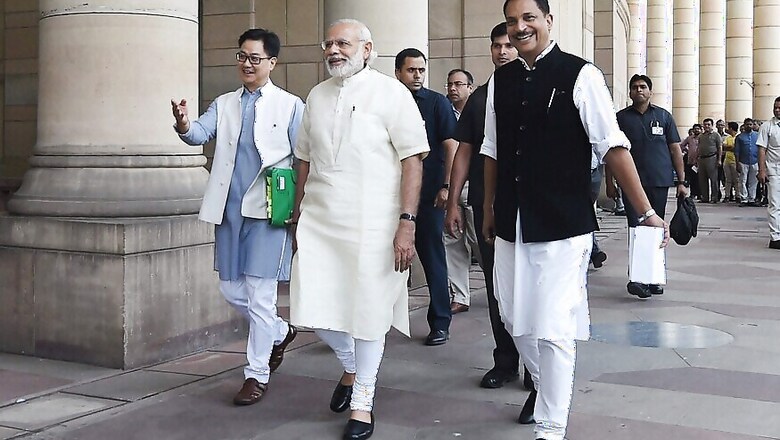
views
It has been two years since Narendra Modi took over as the Prime Minister of India. In May 2014, the Bharatiya Janata Party-led National Democratic Alliance government came with tremendous expectation after one of the biggest electoral wins seen in India.
The Strength Weakness Opportunity Threat (SWOT) analysis is an attempt to see what it has achieved, where it might have failed and what the future holds for it.
In any dynamic situation, these factors vary and can even interchange their positions. Strength can become weakness and vice versa.
These are not absolute statements but these are perceptions which can help in understanding government’s overall performance.
Performance can be enhanced by addressing weak areas. Threats can even be converted into opportunities if they are anticipated in advance.
Strengths:
- There has been a corruption-free governance so far. It has been the biggest change seen in the last few years.
- Modi has established good rapport with many foreign governments and continues to engage with an unreliable Pakistan.
- The government worked out an historic Land Boundary Agreement with Bangladesh to solve the border dispute.
- FDI flow marks an upward growth.
- Modi government has established norms to reduce corruption through Aadhaar card and by opening 71 million bank accounts in rural areas.
- Swachh Bharath Abhiyaan is a major cleanliness initiative which aims to construct toilets in schools and villages.
- Skill India training scheme and solar power exploitation are good initiatives.
- Assistance and encouragement given for start-up for young entrepreneurs.
- Improvement in various indices are a healthy sign.
Weaknesses:
- Religious fringe elements and intemperate voices from MLA/MPs need to be checked.
- Inflation and rising prices of essential commodities are a source of worry.
- Clear policy for industry yet to be crystallized and put in place.
- Poor recovery of huge and indiscriminate loans given by banks to big companies hurting economy.
- Economic defaulters who have fled country have not been brought back.
- There is a perception of tug-of-war with universities and interference that need to be addressed.
- The Prime Minister should use platform like ‘Mann Ki Baat’ to quickly address controversial issues before it gets out of hand.
- An election promise, black money is yet to be brought back to India
- Minority status in the Rajya Sabha halts government’s proposal for reforms such as passage of GST bill.
- Election reversals in states do not augur well for government in power.
Opportunities:
- Reduction in international crude oil prices is a major blessing in disguise allowing better overall fiscal management.
- Recession in global market is a major opportunity for India.
- Slump in Chinese GDP growth rate opens up huge market for Indian markets that could be tapped.
- Make in India initiative backed up by quick implementation of policy decisions will help in the long run.
- Infrastructure development like better roads will be a boost for the business environment.
Threats:
- Fissiparous tendencies among ruling party members creates poor image and will affect administration.
- Delay in implementation in business policies will hurt FDI.
- Delay in taking action against those involved in corruption will be a breach of promise made during elections.
- Time is running out to act on promises made during elections.
- Water will be major issue as many areas face a drought-like situation. Water harvesting, recycling, re-using and desalination can help in dealing with the shortage.















Comments
0 comment